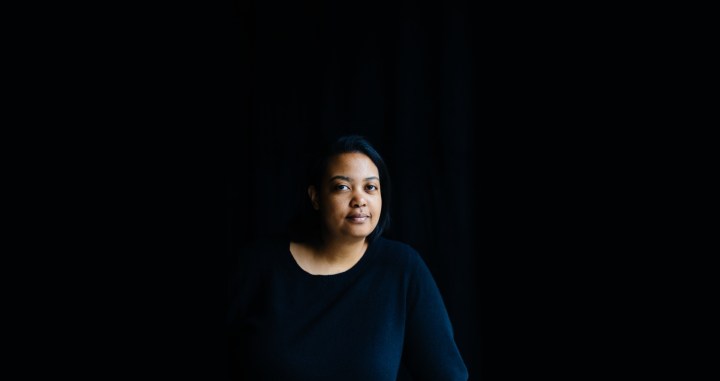
Arlan Hamilton: Changing venture capitalism, diversifying business
Arlan Hamilton: Changing venture capitalism, diversifying business

Change comes in all shapes and sizes, causing seismic shifts and small ripples in industries, businesses and the economy. In the series “Changemakers,” Marketplace explores the changes five women of color have made in their respective industries, and what they hope to see moving forward.
Arlan Hamilton is changing the face of venture capital. She’s not just doing it by being a black woman working in a predominantly white, male space. She’s funding underrepresented businesses — especially those owned by women, people of color and the LGBTQ community — through her VC fund, Backstage Capital.
Hamilton didn’t learn about the VC space at business school. A former production co-ordinator and music manager, she taught herself, watching videos, reading about the industry and following people already working in the field. She founded Backstage Capital in 2015.
Backstage doesn’t just support business owners financially, Hamilton said, “the vast majority have our personal phone numbers.”
According to the company’s website, Backstage has invested roughly $7 million in more than 120 companies and is in the middle of another significant funding round.
Hamilton’s team isn’t slowing down, she told me. Below is an edited transcript of our conversation.
Christabel Nsiah-Buadi: So, why venture capital?
Arlan Hamilton: I looked in from the outside and saw that venture capital could be a tool, if used properly, to help change the dynamics of how funding reaches underrepresented people. I couldn’t do angel investing, which I would love to have done at the time, but didn’t have any money. I learned so much about venture capital by reading and by watching videos and by studying people and their moves that I thought: “Wow, this is already being used by straight white men to further their careers and further their innovations. Why can’t it be used for everyone else?”
Nsiah-Buadi Let’s roll back a little bit. When did you discover venture capital?
Hamilton: I think it was around 2012 that I discovered venture capital. I had been working in the music world and on the touring side, in the bowels of music. It wasn’t glamorous at all, but it was really a fun time with some amazing people.
But I was always curious; there was always something nagging at me from the business world. And so I just started taking note of different people making investments. People like Ellen [DeGeneres], people like Troy Carter were making investments in startups and I wanted to know: what did that mean? What were startups? And I realized after studying it for a little bit that I had been an entrepreneur my whole life. I just didn’t know the jargon, I didn’t know what it all meant. It was a calling rather than something that I studied. So that’s what led me on my path to studying with intention.

Nsiah-Buadi: It’s funny you say that because I was listening to the first episode of your podcast and you talked about how you’ve been relied upon by family members and by friends, to support them in a variety of ways. Hearing that experience was part of your impetus, maybe, was quite striking to me …
Hamilton: It was really just having grown up as a black woman myself, obviously, but also growing up around black and brown women and just seeing what they’re capable of with so few resources. We just make things happen. Historically we have put things in play that, a lot of times, other people get the credit for. And so to me it just seemed like two things happening at the same time. One was that this funding needed to go to founders and they needed the capital to keep it going.
But at the same time, investors were not seeing the forest for the trees. They were just doubling down on one type of person or couple of types of people because of the previous success they’d seen in one, two or three different companies. And it just was myopic. And so to open that lens up just made more sense to me.
Nsiah-Buadi: Let’s talk about Backstage Capital, for the uninitiated.
Hamilton: Backstage Capital is a boutique venture fund. We invest in underrepresented founders. To us that is women, people of color and LGBT founders and other people who are underestimated. And we invest mostly in the tech world. [We invest] smaller checks; $25,000, $50,000, $100,000.
We’ve invested in more than 125 companies since 2015 and we now have an accelerator that invests in 24 companies across four cities and two countries. We source the best underrepresented talent and the leaders of tomorrow and we give them confidence checks so that they can keep going. We also have Backstage Studio, which helps manage the accelerator and other innovations and products.
Nsiah-Buadi: You said the amount you invest is relatively small compared to others. How have you seen those “relatively small” amounts work?
Hamilton: Yes, it is relatively small when you’re talking about venture capital. A lot of deals are $2 million, $3 million rounds and we’re in for $50,000 of that. So in the grand scheme of things, it is a smaller amount of money, it’s more like an angel-sized check, even an accelerator-sized check. But the impact that it has is really around the timing or even the confidence boost or the morale boost, or the signaling that it gives, which is what we’ve been able to build up with our reputation.
When a founder receives a check from Backstage Capital today they are understood to be one of the most robust and highest quality companies out there, because they would have had to beat out dozens and dozens of other companies just to get that smaller check. And the size of our checks is based on how much money we have been able to raise. It’s not the amount of money we want to give. We would love to invest millions into these companies because we feel that they are worthy of that. We feel that we would make a good return in that way.
Nsiah-Buadi: You have used money to, effectively, change society or at least support people who are trying to create social returns. How do you, as someone in venture capital, find that balance between a social return and a financial return?
Hamilton: This is not something where I’m trying to make a quick buck, or I’m trying to impress somebody. I look at this as a long-term play and what I see in the long-term is Backstage doing really well financially, economically. Because I think about it in those terms, because I know what we’ve made bets on, because I know the work we put in each and every day, the work that is not seen from the outside, I am comfortable being uncomfortable. You can’t control everything. So I’m comfortable in knowing this will work out and that when it does we stand to gain a lot.
I’m taking in more than I ever have the social impact angle of it. I love seeing that thing that you can’t can’t quantify which is a black woman saying that she started a company because we exist. You can’t put a number on that, and you can’t take that away.

Nsiah-Buadi: What do you see as a tangible impact you’ve had on your industry? You as a black woman founder of a VC; have you seen what you’ve done change the space, change the community, the country, maybe?
Hamilton: If I were to go too far into it, it would sound a little vain. But when I do step outside of it and I think about it, it’s undeniable at this point. I think that we changed the conversation. We helped change the narrative.
People are being taken more seriously now. With that comes a lot of responsibility, because people are looking to us to fail, or to not live up to certain standards. The funny thing is that there is no one on this Earth who can look at us with a more critical eye than we do. So we’re always going to reach the standard that we place in front of us. But I think that it would be a little disingenuous to say “Oh, we haven’t done much.” I think it’s definitely different than it was five years ago and that’s us, that’s a few other people in the market too. That’s 645 Ventures, that’s Cross Culture [Ventures], Harlem Capital [and] Kesha Cash’s Impact [America] Fund. It’s a lot of people. I think what Backstage has done specifically, that we can take some more credit for, is that we’re pretty good at amplifying the work that we do, because I think it’s about representation. So it’s one thing to do a lot of the work but if I were a little bit more humble, maybe not enough people would hear about it. I think it’s important to amplify it, whether it’s seen as self-centered or not.
Nsiah-Buadi: What do you think makes you a changemaker?
Arlan Hamilton: Oh, man! I think there are a lot of people who talk about things and talk about problems and maybe even talk about solutions. There are fewer people who act and fewer people who act with the intensity and the intention that I do. And that some of my peers do. And so I think the reason I’ve been able to make change happen is because I’m relentless in the execution of it. It doesn’t stop at the “oh, I wish” or “I think.” It can never just stop there for me. It’s about completing the mission. [laughs]
I feel like there is a great mission here and I won’t stop until I am obsolete and I’m not needed, [until] we are not underrepresented.
Listen to Arlan Hamilton by clicking on the audio player above.
There’s a lot happening in the world. Through it all, Marketplace is here for you.
You rely on Marketplace to break down the world’s events and tell you how it affects you in a fact-based, approachable way. We rely on your financial support to keep making that possible.
Your donation today powers the independent journalism that you rely on. For just $5/month, you can help sustain Marketplace so we can keep reporting on the things that matter to you.


















